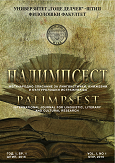INTERCULTURAL COMMUNICATION IN GERMAN LESSON: EVALUATION AND SELF-REFLECTION ON AN INTERCULTURAL TEACHING SEQUENCE
DOI:
https://doi.org/10.46763/PALIM24918221jAbstract
In addition to acquiring the ability to communicate in a foreign language, acquiring an open and tolerant attitude towards the country and people of the language being taught has long been a natural and integrated learning goal of foreign language teaching. In order to integrate this learning goal, it is important to know how specific cultural and intercultural values can be conveyed. This can now be treated from different scientific perspectives. Nevertheless, especially in foreign language teaching, it is interesting and important to look at cross-cultural topics from a didactic perspective. As part of this work, the terms intercultural learning, intercultural competence, intercultural communication and culturally reflective learning were examined and discussed based on the relevant specialist literature. In this regard, a teaching proposal on the topic of “food” was implemented in the Albanian context at the Goethe Center Tirana with the aim of promoting intercultural learning. The teaching suggestion on the topic of “Food” is intended to give teachers systematic and didactic suggestions for the use of culturally reflective learning in foreign language lessons. Intercultural learning has long been a topic in the fields of foreign and second language teaching research, and there is interest beyond it. This work therefore aims to provide a coherent overview that can be used for the development of intercultural language teaching. In addition, it takes into account the aspect of intercultural learning that can no longer be neglected in intercultural foreign language teaching in Albania.
Keywords: intercultural communication; culturally reflective learning; GFL lessons; self-reflection.
Downloads
Downloads
Published
Issue
Section
License
The intellectual property and copyright on the original content of all scientific contributions in the published paper shall remain with the authors. Authors give permission to the JAPS owner to publish the paper. All authors agree to publish the paper under Attribution-NonCommercial-NoDerivatives 4.0 International license (CC BY-NC-ND 4.0)


